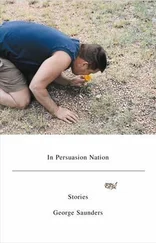Lincoln in the Bardo
George Saunders


Part One

I.
On our wedding day I was forty-six, she was eighteen. Now, I know what you are thinking: older man (not thin, somewhat bald, lame in one leg, teeth of wood) exercises the marital prerogative, thereby mortifying the poor young—
But that is false.
That is exactly what I refused to do, you see.
On our wedding night I clumped up the stairs, face red with drink and dance, found her arrayed in some thinnish thing an aunt had forced her into, silk collar fluttering slightly with her quaking — and could not do it.
Speaking to her softly, I told her my heart: she was beautiful; I was old, ugly, used up; this match was strange, had its roots not in love but expedience; her father was poor, her mother ill. That was why she was here. I knew all of this very well. And would not dream of touching her, I said, when I could see her fear and — the word I used was “distaste.”
She assured me she did not feel “distaste” even as I saw her (fair, flushed) face distort with the lie.
I proposed that we should be…friends. Should behave outwardly, in all things, as if we had consummated our arrangement. She should feel relaxed and happy in my home and endeavor to make it her own. I would expect nothing more of her.
And that is how we lived. We became friends. Dear friends. That was all. And yet that was so much. We laughed together, made decisions about the household — she helped me bear the servants more in mind, speak to them less perfunctorily. She had a fine eye and accomplished a successful renovation of the rooms at a fraction of the expected cost. To see her brighten when I came in, find her leaning into me as we discussed some household matter, improved my lot in ways I cannot adequately explain. I had been happy, happy enough, but now I often found myself uttering a spontaneous prayer that went, simply: She is here, still here. It was as if a rushing river had routed itself through my house, which was pervaded now by a freshwater scent and the awareness of something lavish, natural, and breathtaking always moving nearby.
At dinner one evening, unprompted, before a group of my friends, she sang my praises — said I was a good man: thoughtful, intelligent, kind.
As our eyes met I saw that she had spoken in earnest.
Next day, she left a note on my desk. Although shyness prevented her from expressing this sentiment in speech or action, the note said, my kindness to her had resulted in an effect much to be desired: she was happy, was indeed comfortable in our home, and desired, as she put it, to “expand the frontiers of our happiness together in that intimate way to which I am, as yet, a stranger.” She requested that I guide her in this as I had guided her “in so many other aspects of adulthood.”
I read the note, went in to supper — found her positively aglow. We exchanged frank looks there in front of the servants, delighted by this thing we had somehow managed to make for ourselves from such unpromising materials.
That night, in her bed, I was careful not to be other than I had been: gentle, respectful, deferential. We did little — kissed, held one another — but imagine, if you will, the richness of this sudden indulgence. We both felt the rising tide of lust (yes, of course) but undergirded by the slow, solid affection we had built: a trustworthy bond, durable and genuine. I was not an inexperienced man — had been wild when young; had spent sufficient time (I am ashamed to say) in Marble Alley, at the Band-box, at the dreadful Wolf’s Den; had been married once before, and healthily so — but the intensity of this feeling was altogether new to me.
It was tacitly understood that, next night, we would further explore this “new continent,” and I went to my printing offices in the morning fighting the gravitational pull that bid me stay home.
And that day — alas — was the day of the beam.
Yes, yes, what luck!
A beam from the ceiling came down, hitting me just here, as I sat at my desk. And so our plan must be deferred, while I recovered. Per the advice of my physician, I took to my—
A sort of sick-box was judged — was judged to be—
hans vollman
Efficacious.
roger bevins iii
Efficacious, yes. Thank you, friend.
hans vollman
Always a pleasure.
roger bevins iii
There I lay, in my sick-box, feeling foolish, in the parlor, the very parlor through which we had recently (gleefully, guiltily, her hand in mine) passed en route to her bedroom. Then the physician returned, and his assistants carried my sick-box to his sick-cart, and I saw that — I saw that our plan must be indefinitely delayed. What a frustration! When, now, would I know the full pleasures of the marriage-bed; when behold her naked form; when would she turn to me in that certain state, mouth hungry, cheeks flushed; when would her hair, loosened in a wanton gesture, fall at last around us?
Well, it seemed we must wait until my recovery was complete.
A vexing development indeed.
hans vollman
And yet all things may be borne.
roger bevins iii
Quite so.
Although I confess I was not of that mind at the time. At that time, there on the sick-cart, as yet unbound, I found I could briefly leave my sick-box, darting out and causing little duststorms, and even cracked a vase, a vase on the porch. But my wife and that physician, earnestly discussing my injury, did not notice. I could not abide it. And threw a bit of a tantrum, I admit, and sent the dogs yipping away, by passing through them and inducing in each a dream of a bear. I could do that then! Those were the days! Now I could no more induce a dream of a bear in a dog than I could take our silent young friend here out to dinner!
(He does appear young, doesn’t he, Mr. Bevins? In his contours? His posture?)
In any event, I returned to my sick-box, weeping in that way that we have — have you come to know this yet, young fellow? When we are newly arrived in this hospital-yard, young sir, and feel like weeping, what happens is, we tense up ever so slightly, and there is a mildly toxic feeling in the joints, and little things inside us burst. Sometimes we might poop a bit if we are fresh. Which is just what I did, out on the cart that day: I pooped a bit while fresh, in my sick-box, out of rage, and what was the result? I have kept that poop with me all this time, and as a matter of fact — I hope you do not find this rude, young sir, or off-putting, I hope it does not impair our nascent friendship — that poop is still down there, at this moment, in my sick-box, albeit much dryer!
Goodness, are you a child?
He is, isn’t he?
hans vollman
I believe so. Now that you mention it.
Here he comes.
Nearly fully formed now.
roger bevins iii
My apologies. Good God. To be confined to a sick-box while still a child — and have to listen to an adult detailing the presence of a dried poop in his sick-box — is not exactly the, uh, ideal way to make one’s entree into a new, ah—
A boy. A mere lad. Oh dear.
Many apologies.
hans vollman
II.
“You know,” Mrs. Lincoln said to me, “The President is expected to give a series of state dinners every winter, and these dinners are very costly. If I give three large receptions, the state dinners can be scratched from the programme. If I can make Mr. Lincoln take the same view of the case, I shall not fail to put the idea into practice.”
Читать дальше















